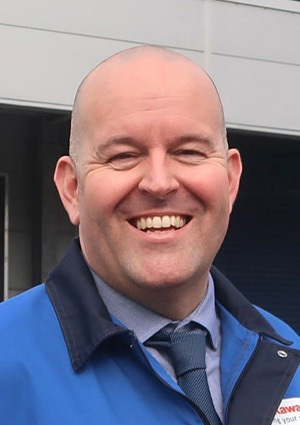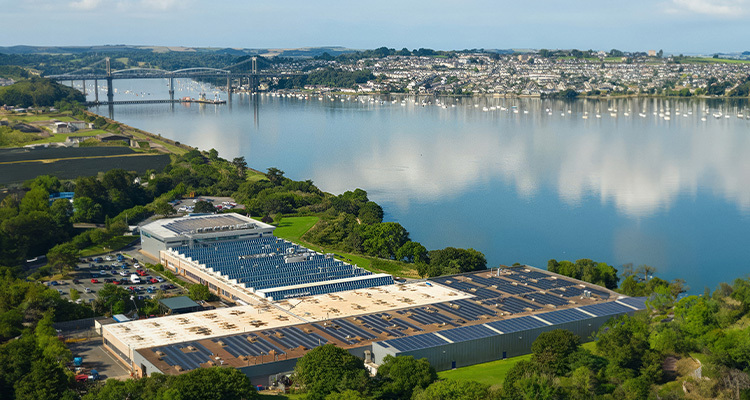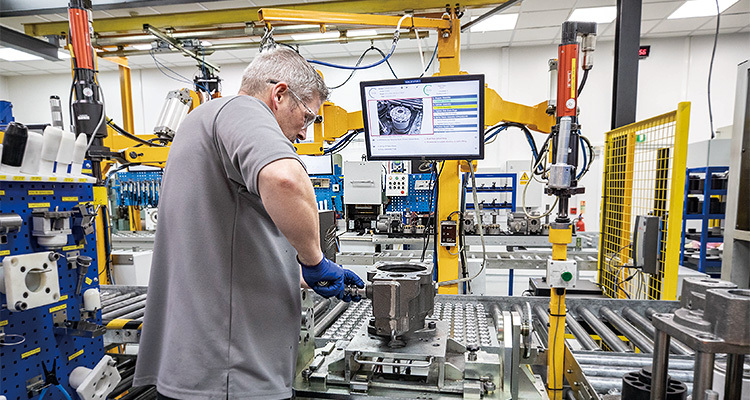With a goal to beat net-zero targets, Kawasaki Precision Machinery UK is implementing innovation across its operations
Kawasaki is a well-known business for many reasons, and this month, Manufacturing Today had the pleasure of learning more about its machinery capabilities. In a conversation with Lee Crocker, Managing Director, we showcase Kawasaki Precision Machinery UK Ltd (KPM UK), a subsidiary company of the Kawasaki Precision Machinery division, and part of Kawasaki Heavy Industries (KHI). We highlight how the total system engineering company is leading the way in hydraulics, and supplying equipment for a range of applications in the industrial, construction, agriculture, and marine markets.
“Kawasaki took over the business, based on the banks of the River Tamar in Plymouth, 30 years ago before it was Vickers System,” begins Lee. “Prior to that, it was a tool making company called Brown and Sharpe. We still have employees who have worked for all three companies, and some go as far back as Chamberlin Industries, based in Leyton, London where the Staffa Radial Piston motor was developed and manufactured before production moved to the Ernesettle site in Plymouth in 1982.”

The business has since expanded sales into many regions, markets, and applications all over the world, including many mobile, off-highway, industrial, and marine applications. “We have a multi-channel approach to market including 44 distribution partners throughout Europe, the Middle East, South Africa, and all the way down to Australia. We also use our sister companies to ship into the US, Japan, Korea, India, and China. One of our largest customers for our radial piston motor is a winch manufacturer based in Shimonoseki on the western tip of Japan,” Lee divulges.
“Since 1994, KPM UK has expanded greatly, increasing revenues from £11 million to £55 million, with 80 percent of what is produced being exported all over the world. Our business contributes a GVA of around £24 million to the local economy per annum and we have 230 employees across manufacturing, sales, engineering, and other support functions such as HR, IT, finance, and customer services.”
Hydraulic advancements
When asked about the scope of products and services, Lee explains that Kawasaki products are synonymous with excellence in fluid power. “Designed to meet the challenging demands of various industrial applications, we offer superior and consistent performance, efficiency, and durability in the most challenging environments.
“We don’t just manufacture and distribute hydraulic pumps, valves, and motors, we help our customers increase their efficiency and reduce costs through development partnerships. We develop bespoke solutions to fulfill our customers’ requirements. We do this by providing an excellent end-to-end engineering service, coupled with superior product quality and reliability, which sets our products and systems apart from the competition.”
Lee goes on to detail the company’s advancements in hydraulic systems and manufacturing processes. Highlighting the market shift towards electric and hydrogen fuel cell engines and autonomous vehicles, he emphasizes the development of intelligent systems like condition monitoring and digital control. KPM UK’s latest innovation, a smart digitally controlled radial piston motor, holds global patent pending status, with similar advancements in axial piston pumps underway. With a focus on Industry 4.0, the business ensures end-to-end traceability with SCADA systems and meticulous quality control measures, earning accolades from both European and Japanese auditors. Cybersecurity measures are also critical, given its reliance on digital traceability, while streamlining ERP systems is just as important to enhancing efficiency and customer service.
To support the company’s advances in the fluid power industry, KPM UK is an active board member of British Fluid Power Association (BFPA), engaged in reviewing technology trends and reviewing or setting standards within the sector.
Green strategies 
The conversation then moves away from the operational side of the business, and onto its role within the wider industry. Beginning with sustainability, Lee sheds light on the company’s plans to assist the sector’s efforts to reach Net Zero. “Since 2017, we have implemented one megawatt of solar power to the site reducing its carbon footprint by 265 tons per annum, which accounts for 24 percent of our energy used on site. KPM UK, aligned with Kawasaki Heavy Industries, has a plan to achieve Net Zero for Scope 1 and 2 by 2030 and for Scope 3 by 2050. KPM UK is now in the process, as are many manufacturing companies, of mapping its Scope 3 activities and planning for its net-zero strategy.”
However, to achieve these targets, Lee expresses that the government needs to further assist the manufacturing industry. “As explained at the recent Make UK conference, manufacturing represents £400 billion of the UK’s GDP in export, so we would like to see the government develop a long-term industrial strategy. Coupled with economic and fiscal stability, this is important to facilitate long-term growth.
“Within the industrial strategy, we would like to see consideration given to continued enhanced tax credits for advanced and sustainable manufacturing, increased investment into education focusing on STEM subjects, support for energy prices, investment in renewable energy infrastructure, increased incentives for investment in automation and digitization, and the continued full expensing for capital investment.”
As reported by the Plymouth Manufacturing Group (PMG), some 13,000 people are employed by manufacturing businesses in Plymouth, contributing 17 percent GVA to the Plymouth economy, and a combined annual revenue of £2.7 billion. “Many of these companies are also backed by foreign investors based in the UK who export all over the world. Therefore, we would also like to see the government’s ‘Levelling Up’ agenda include more investment in the South-West for infrastructure, STEM education and skills, and innovation funding.”
Training for the future
In the meantime, Lee expresses that KPM UK is doing what it can to make manufacturing attractive to as many potential apprentices as possible. “We have had apprentices in IT, machining, maintenance, and application engineering as well as in process engineering. We have good examples of apprentices who stay and progress within our company. For example, our manufacturing engineering manager is an ex-apprentice. Our current chair of the board is a former apprentice. He retired seven years ago, but he came up through the apprenticeship route working in sales, HR, and production. He became general manager and then managing director. When he retired, he became chair. We have always invested in the skills and training of our employees and their expertise is part of our success, and we are continuing to develop and evolve those skills to stay successful and competitive for the future.”
“Our approach is to try to be visible from a STEM perspective. We are active in school outreach. This year, some of our engineers gave a presentation in a local school, talking to over 200 students about Kawasaki, what it’s like to work for us and what the career prospects are and so on.”
Lee himself has served as an external adviser for Plymouth University’s School of Engineering. In 2023, he was part of the accreditation team that looked at the university’s undergraduate degree syllabus. KPM UK also sponsors an award for the Best Final Year Student. It is also active within the Industrial Advisory Committee, which Lee chaired for three years. “Also, as part of my role within the Plymouth Manufacturing Group, we are a partner of Plymouth City College, where we give advice on their courses and on how they can better support local manufacturing. So, we are actively engaged in encouraging young people to enter our industry and give them our full backing and encouragement,” he shares.
Looking to the future, Lee expresses that KPM UK is changing its leadership approach to strategy deployment. He divulges that KPM UK has excellent employees, and to win going forward, is seeking companywide engagement to achieve its all-important goals. “Our key markets are currently experiencing slower demand, so it’s crucial that we focus on improving our processes now to be responsive and agile as sales increase in the second half of 2024. We will also launch the digital SMART Staffa Motor, continue to develop our condition monitoring systems and higher-pressure axial piston pump, and focus on growing our aftermarket business,” Lee concludes.
KPM UK’s innovation in hydraulic systems and manufacturing processes sets a new standard in the industry. With these new advancements, KPM UK will continue to lead Europe’s fluid power sector.

